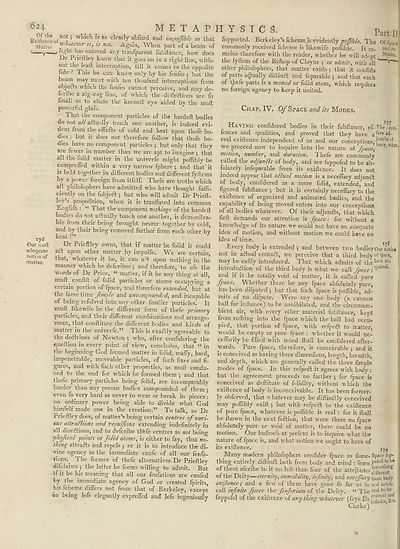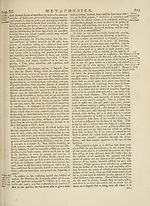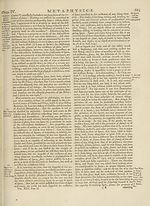Encyclopaedia Britannica, or, a Dictionary of arts, sciences, and miscellaneous literature : enlarged and improved. Illustrated with nearly six hundred engravings > Volume 13, MAT-MIC
(670) Page 624
Download files
Complete book:
Individual page:
Thumbnail gallery: Grid view | List view

624
Ex?ftenceofn0i ’ ^ clearty akfurd and impojible as that
Matter whatever is, is not. Again, When part of a beam of
V—-/ ■1>as entered any tranfparent fubifance, how does
i)r Prieitiey know that it goes on in a right line, with¬
out the leaft interruption, till it comes to the oppofite
fide ? 1 his he can know only by his fenfes ; but the
beam may meet with ten thoufand interruptions from
objects which the fenfes cannot perceive, and may de¬
le, ibe a zig-zag line, of which the dededlions are fo
fmall as to elude the keeneit eye aided by the moll
powerful glafs.
That the component particles of the hardeft bodies
do not a// afttrally touch one another, is indeed evi¬
dent from the effeas of cold and heat upon thofe bo¬
dies : but it does not therefore follow that thofe bo¬
dies have no component particles 5 but only that they
are fewer in number than we are apt to imagine ; that
all the folid matter in the univerfe might poffibly be
comprelfed within a very narrow fphere •, and that it
is held together in different bodies and different fyllems
by a power foreign from itfelf. Thefe are truths which
all philofophers have admitted who have thought futfi-
ciently on the fubjeft 5 but who will admit Dr Prieff-
ley’s propofition, when it is tranllated into common
Englilh : “ That the component nothings of the hardeft
bodies do not a£lually touch one another, is demonilra-
ble from their being brought nearer together by cold,
and by their being removed farther from each other by
i75 heat
Our moft Dr Prieftley owns, that if matter be folid it could
adequate aft upon other matter by impulfe. We are certain,
matter°f w^ate#ver ^ bei it can aft upon nothing in the
manner which he deferibes; and therefore, to ufe the
words of Dr Price, “ matter, if it be any thing at all,
muff conlift of folid particles or atoms occupying a
certain portion of (pace, and therefore extended, but at
the lame time Jimp/e and uncompounded, and incapable
of being refolved into any other fmaller particles. It
muff likewife be the different form of thefe primary
particles, and their different combinations and arrange¬
ment, that conftitute the different bodies and kinds of
matter in the univerfe.” This is exaftly agreeable to
the doftiines of Newton ; who, after confidering the
queffion in. every point of view, concludes, that “ in
the beginning God formed matter in folid, maffy, hard,
impenetrable, moveable particles, of fuch fizes and fi¬
gures, and with fuch other properties, as moft condu¬
ced to the end for which he formed them ; and that
thofe primary particles being folid, are incomparably
harder than any porous bodies compounded of them 5
even fo very hard as never to wear or break in pieces :
no ordinary power being able to divide what God
himfelf made one in the creation.” To talk, as Dr
Prieftley does, of matter’s being certain centres of vari¬
ous attra&ions and repu/fons extending indefinitely in
all direftions, and to deferibe thfcfe centres as not being
ph/Jical points or folid atoms, is either to fay, that no¬
thing attrafts and repels ; or it is to introduce the di¬
vine agency as the immediate caufe of all our fenfa-
ti.ons.. The former of thefe alternatives Dr Prieftley
difelaims.} the latter he feems willing to admit. But
if it be his meaning that all our fenfations are caufed
by the immediate agency of God or created fpirits,
his fcheme differs not from that of Berkeley, except
«n being lefs elegantly exprefled and lefs ingenioufly
Part III
fupported. Berkeley’s fcheme is evidently p^fible. The OfSpaca
commonly received fcheme is likewife poftible. It re- and it,
mains therefore with the reader, whether he will adopt Modes-
the lyftem of the Bithop of Cloyne 5 or admit, with all ^ 'r^‘
other philofophers, that matter exifts ; that it confifts
of parts actually diftinft and feparable ; and that each
of thefe parts is a monad or folid atom, which requires
no foreign agency to keep it united.
Chap. IV. Of Space and its Modes.
Having confidered bodies in their fubftance, ef-The^Lb
fences and qualities, and proved that they have afary ad-
real exiftence independent of us and our conceptions
we proceed now to inquire into the nature of /pace, 0U3r,what’
motion, number, and duration. Thefe are commonly
called the adjunBs of body, and are fuppofed to be ab-
folutely infeparable from its exiftence. It does not
indeed appear that attual motion is a neceffary adiunft
of body, confidered as a mere folid, extended," and
figured iubftance j but it is certainly neceffary to the
exiftence of organized and animated bodies, and the
capability of being moved enters into our conceptions
of all bodies whatever. Of thefe adjunfts, that which
firrt demands our attention is /pace: for without a
knowledge of its nature we could not have an adequate
idea of motion, and without motion we could have no
idea of time.
Every body is extended 3 and between two bodies OunLtio*
not in aftual contaft, we perceive that a third body of (pace,
may be eafily introduced. That which admits of thehowac-
introduftion of the third body is what we call fpace tquired'
and if it be totally void of matter, it is called pure
fpace. Whether there be any fpace abfolutely pure,
has been difputed 3 but that fuch fpace is poffible, ad¬
mits of no difpute. Were any one body (a cannon
ball for inftar.ee) to be annihilated, and the circumam¬
bient air, with every other material fubftance, kept
from ruffling into the fpace which the ball had occu¬
pied, that portion of fpace, with refpeft to matter,
would be empty or pure fpace : whether it would ne-
ceffarily be filled with mind fliall be confidered after¬
wards. Pure fpace, therefore, is conceivable 3 and it
is conceived as having three dimenfions, length, breadth,
and depth, which are generally called the three fimple
modes of fpace. In this refpeft it agrees with body :
but the agreement proceeds no farther 3 for fpace is
conceived as deftitute of folidity, without which the
exiftence of body is inconceivable. It has been former¬
ly obferved, that ubatever may be diftinftly conceived
may poflibly exift ; but with refpeft to the exiftence
of pure fpace, whatever is poflible is real : for it {hall
be fhown in the next feftion, that wrere there no fpace
abfolutely pure or void of matter, there could be no
motion. Our bufinefs at prefent is to inquire what the
nature of fpace is, and what notion we ought to have of
its exiftence.
.Many modern philofophers confider fpace as fome- Space fup-
thing entirely diftinft both from body and mind : fome Poled'° b*
of them a.fcribe to it no lefs than four of the attributes
of the Deity—eternity, immobility, infinity, and necefjary fR,m body
exigence; and a few of them have gone fo far as to a d nurd,
call infinite fpace the fenfsrium oi the Deity. “ q'|ie and to be
fuppofal of the exiftence of any thing whatever (fays Dr^-^ ^c.
Clarke)
METAPHYSICS.
Ex?ftenceofn0i ’ ^ clearty akfurd and impojible as that
Matter whatever is, is not. Again, When part of a beam of
V—-/ ■1>as entered any tranfparent fubifance, how does
i)r Prieitiey know that it goes on in a right line, with¬
out the leaft interruption, till it comes to the oppofite
fide ? 1 his he can know only by his fenfes ; but the
beam may meet with ten thoufand interruptions from
objects which the fenfes cannot perceive, and may de¬
le, ibe a zig-zag line, of which the dededlions are fo
fmall as to elude the keeneit eye aided by the moll
powerful glafs.
That the component particles of the hardeft bodies
do not a// afttrally touch one another, is indeed evi¬
dent from the effeas of cold and heat upon thofe bo¬
dies : but it does not therefore follow that thofe bo¬
dies have no component particles 5 but only that they
are fewer in number than we are apt to imagine ; that
all the folid matter in the univerfe might poffibly be
comprelfed within a very narrow fphere •, and that it
is held together in different bodies and different fyllems
by a power foreign from itfelf. Thefe are truths which
all philofophers have admitted who have thought futfi-
ciently on the fubjeft 5 but who will admit Dr Prieff-
ley’s propofition, when it is tranllated into common
Englilh : “ That the component nothings of the hardeft
bodies do not a£lually touch one another, is demonilra-
ble from their being brought nearer together by cold,
and by their being removed farther from each other by
i75 heat
Our moft Dr Prieftley owns, that if matter be folid it could
adequate aft upon other matter by impulfe. We are certain,
matter°f w^ate#ver ^ bei it can aft upon nothing in the
manner which he deferibes; and therefore, to ufe the
words of Dr Price, “ matter, if it be any thing at all,
muff conlift of folid particles or atoms occupying a
certain portion of (pace, and therefore extended, but at
the lame time Jimp/e and uncompounded, and incapable
of being refolved into any other fmaller particles. It
muff likewife be the different form of thefe primary
particles, and their different combinations and arrange¬
ment, that conftitute the different bodies and kinds of
matter in the univerfe.” This is exaftly agreeable to
the doftiines of Newton ; who, after confidering the
queffion in. every point of view, concludes, that “ in
the beginning God formed matter in folid, maffy, hard,
impenetrable, moveable particles, of fuch fizes and fi¬
gures, and with fuch other properties, as moft condu¬
ced to the end for which he formed them ; and that
thofe primary particles being folid, are incomparably
harder than any porous bodies compounded of them 5
even fo very hard as never to wear or break in pieces :
no ordinary power being able to divide what God
himfelf made one in the creation.” To talk, as Dr
Prieftley does, of matter’s being certain centres of vari¬
ous attra&ions and repu/fons extending indefinitely in
all direftions, and to deferibe thfcfe centres as not being
ph/Jical points or folid atoms, is either to fay, that no¬
thing attrafts and repels ; or it is to introduce the di¬
vine agency as the immediate caufe of all our fenfa-
ti.ons.. The former of thefe alternatives Dr Prieftley
difelaims.} the latter he feems willing to admit. But
if it be his meaning that all our fenfations are caufed
by the immediate agency of God or created fpirits,
his fcheme differs not from that of Berkeley, except
«n being lefs elegantly exprefled and lefs ingenioufly
Part III
fupported. Berkeley’s fcheme is evidently p^fible. The OfSpaca
commonly received fcheme is likewife poftible. It re- and it,
mains therefore with the reader, whether he will adopt Modes-
the lyftem of the Bithop of Cloyne 5 or admit, with all ^ 'r^‘
other philofophers, that matter exifts ; that it confifts
of parts actually diftinft and feparable ; and that each
of thefe parts is a monad or folid atom, which requires
no foreign agency to keep it united.
Chap. IV. Of Space and its Modes.
Having confidered bodies in their fubftance, ef-The^Lb
fences and qualities, and proved that they have afary ad-
real exiftence independent of us and our conceptions
we proceed now to inquire into the nature of /pace, 0U3r,what’
motion, number, and duration. Thefe are commonly
called the adjunBs of body, and are fuppofed to be ab-
folutely infeparable from its exiftence. It does not
indeed appear that attual motion is a neceffary adiunft
of body, confidered as a mere folid, extended," and
figured iubftance j but it is certainly neceffary to the
exiftence of organized and animated bodies, and the
capability of being moved enters into our conceptions
of all bodies whatever. Of thefe adjunfts, that which
firrt demands our attention is /pace: for without a
knowledge of its nature we could not have an adequate
idea of motion, and without motion we could have no
idea of time.
Every body is extended 3 and between two bodies OunLtio*
not in aftual contaft, we perceive that a third body of (pace,
may be eafily introduced. That which admits of thehowac-
introduftion of the third body is what we call fpace tquired'
and if it be totally void of matter, it is called pure
fpace. Whether there be any fpace abfolutely pure,
has been difputed 3 but that fuch fpace is poffible, ad¬
mits of no difpute. Were any one body (a cannon
ball for inftar.ee) to be annihilated, and the circumam¬
bient air, with every other material fubftance, kept
from ruffling into the fpace which the ball had occu¬
pied, that portion of fpace, with refpeft to matter,
would be empty or pure fpace : whether it would ne-
ceffarily be filled with mind fliall be confidered after¬
wards. Pure fpace, therefore, is conceivable 3 and it
is conceived as having three dimenfions, length, breadth,
and depth, which are generally called the three fimple
modes of fpace. In this refpeft it agrees with body :
but the agreement proceeds no farther 3 for fpace is
conceived as deftitute of folidity, without which the
exiftence of body is inconceivable. It has been former¬
ly obferved, that ubatever may be diftinftly conceived
may poflibly exift ; but with refpeft to the exiftence
of pure fpace, whatever is poflible is real : for it {hall
be fhown in the next feftion, that wrere there no fpace
abfolutely pure or void of matter, there could be no
motion. Our bufinefs at prefent is to inquire what the
nature of fpace is, and what notion we ought to have of
its exiftence.
.Many modern philofophers confider fpace as fome- Space fup-
thing entirely diftinft both from body and mind : fome Poled'° b*
of them a.fcribe to it no lefs than four of the attributes
of the Deity—eternity, immobility, infinity, and necefjary fR,m body
exigence; and a few of them have gone fo far as to a d nurd,
call infinite fpace the fenfsrium oi the Deity. “ q'|ie and to be
fuppofal of the exiftence of any thing whatever (fays Dr^-^ ^c.
Clarke)
METAPHYSICS.
Set display mode to:
![]() Universal Viewer |
Universal Viewer | ![]() Mirador |
Large image | Transcription
Mirador |
Large image | Transcription
Images and transcriptions on this page, including medium image downloads, may be used under the Creative Commons Attribution 4.0 International Licence unless otherwise stated. ![]()
| Permanent URL | https://digital.nls.uk/192692757 |
|---|
| Attribution and copyright: |
|
|---|
| Description | Ten editions of 'Encyclopaedia Britannica', issued from 1768-1903, in 231 volumes. Originally issued in 100 weekly parts (3 volumes) between 1768 and 1771 by publishers: Colin Macfarquhar and Andrew Bell (Edinburgh); editor: William Smellie: engraver: Andrew Bell. Expanded editions in the 19th century featured more volumes and contributions from leading experts in their fields. Managed and published in Edinburgh up to the 9th edition (25 volumes, from 1875-1889); the 10th edition (1902-1903) re-issued the 9th edition, with 11 supplementary volumes. |
|---|---|
| Additional NLS resources: |
|

